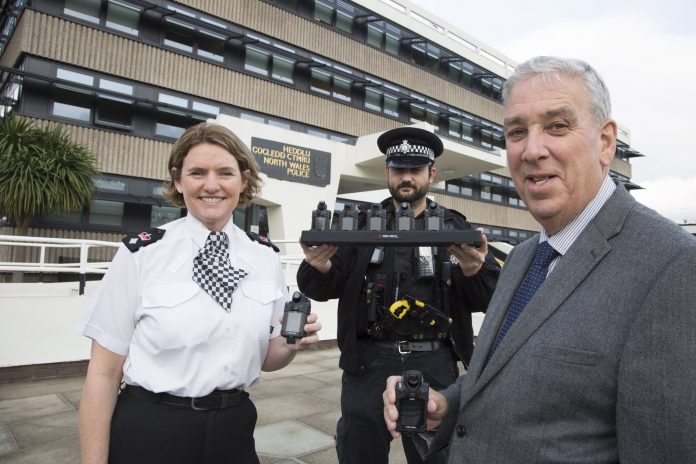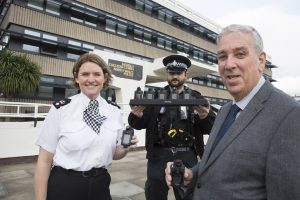
The introduction of chest mounted video cameras in North Wales will undoubtedly save lives in domestic violence cases, according to a police boss.

Investing £163,000 to buy extra kits was one of the first acts of North Wales Police and Crime Commissioner Arfon Jones after he was elected last May.
As he reflected on his first year in office, Mr Jones said the purchase of the kits was his proudest achievement since he took the helm and fulfilled a promise he made to the people of North Wales in his election manifesto.
The deployment of the additional 301 devices and 50 docking stations means North Wales Police is the first force in Wales to give the crime-fighting technology to all its police officers and police community support officers while on front line duty, including members of the specialist firearms and rural crime teams.
The force now has nearly 500 of the devices and using them is now obligatory.
Body worn video can capture evidence of crimes as they happen as well as filming the aftermath of an offence.
On average North Wales Police now gathers 150 individual clips of footage every day.
Around 30 of those clips are stored because of their potential value as evidence while the rest are deleted.
In serious cases it’s possible the clips will be stored for up to 100 years.
One area where the high-tech equipment has already proved particularly useful is after incidents of domestic violence where evidence of any injuries and damage can be gathered along with the behaviour and demeanour of the aggressor and the victim.
Mr Jones, a former police inspector, said: “My proudest achievement since taking office was investing in the body worn videos and getting them out to all frontline officers.
“The feedback I’ve been getting from the police and the Crown Prosecution Service is that the technology is achieving results, and we are getting better and more evidence to prosecute offenders.
“I constantly read there are decent sentences now for domestic abuse which is better than what it’s been in the past so everybody within the criminal justice system is working together to improve outcomes for survivors of domestic abuse.
“I’ve made it such a big priority because it’s a serious offence. If a survivor is stuck there in a house with an abusive partner with no real means of escape until they make that decision, it harms their health over the years.
“It also harms the health of their children, their extended family and they deserve the best that we can offer.
“The importance of tackling this issue is underlined by the fact that two partners of in domestic relationships are killed in England and Wales every week, so that means that over a 100 are killed in England and Wales in a 12 month period which is totally unacceptable. It’s also preventable, if we get the right services in place to stop it.
“Body worn video will help save lives. I have no doubt at all about it, because survivors of domestic abuse are very reluctant to give evidence against their partners because the repercussions are sort of, the coercion and control that they hold over them.
“If we can get evidence independent of that to prosecute, it makes life a lot easier for the survivors, and if the offenders go to prison it gives the survivors and opportunity to rebuild their lives and move on without fear of being stalked or harassed by partners or ex partners.”
During the year, Mr Jones was also pleased he had been able to focus debate on a number of other important subjects including drugs policies, modern slavery, security concerns as a result of Brexit and the inequality of funding between North Wales and South Wales.
Looking forward to the rest of his term of office, Mr Jones called for more regional collaboration to make the most of the funding that is available to North Wales.
Mr Jones added: “We have had successes, notably with Annwen Morgan from Anglesey who leads on the work around modern slavery, and Mohammed Mehmet from Denbighshire is progressing with important work around Child Sexual Exploitation.
“I am also calling for the Safer Communities Board to have a regional budget whereby we can commission services as and when we need around issues like modern slavery and children affected by parental imprisonment. At present the decision making process around this Board is both slow and bureaucratic and that is unacceptable.”
“We’ve got too many organisations trying to do the same kinds of things in Wales. We’ve got local public service boards, we’ve got community safety partnerships, we’ve got children’s safeguarding, adult safeguarding, safer communities board, area planning board and the regional leadership board.
“We need to rationalise some of these Boards and I welcome the work the Welsh Government are doing around regional collaboration and Community Safety.
“I could spend my whole time going to meetings but I won’t because the ones I’ve been to have achieved very little up to now.
“The area planning board and the health board are responsible for distributing about £10 millions’ worth of funding to prevent substance abuse and it’s still a mystery to me how it operates 12 months later, but after spending the day with front line workers from Cais and Caniad I now have a far better understanding of what services are out there and how they integrate especially around the NPS problem in Wrexham.
The commissioner was pleased the force had recruited 16 new police officers from Dwyfor Meirionnydd.
The 11 men and five women are now undergoing six months of intense training at Dolgellau police station.
North Wales Police had originally struggled to attract enough applicants wanting to work in the area.
One of the main problems for people living locally was that they would have had to commute daily to St Asaph for the duration of the six-month training course.
For some it would have involved a two-hour journey each way so the answer was to switch the training venue for this group of trainee officers.
Mr Jones said, “Recruitment from some areas has always been difficult and I am committed to ensuring opportunities to all communities in North Wales and it was important to recruit local, fluent Welsh speakers from Dwyfor Meirionnydd to serve their own communities.”



























